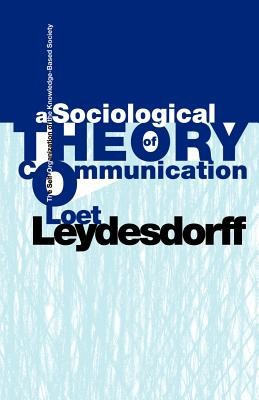
- We will send in 10–14 business days.
- Author: Loet Leydesdorff
- Publisher: Universal Publishers
- Year: 2001
- Pages: 372
- ISBN-10: 1581126956
- ISBN-13: 9781581126952
- Format: 14 x 21 x 2.3 cm, softcover
- Language: English
- SAVE -10% with code: EXTRA
Reviews
Description
Networks of communication evolve in terms of reflexive exchanges. The codification of these reflections in language, that is, at the social level, can be considered as the operating system of society. Under sociologically specifiable conditions, the discursive reconstructions can be expected to make the systems under reflection increasingly knowledge-intensive.
This sociological theory of communication is founded in a tradition that includes Giddens' (1979) structuration theory, Habermas' (1981) theory of communicative action, and Luhmann's (1984) proposal to consider social systems as self-organizing. The study also elaborates on Shannon's (1948) mathematical theory of communication for the formalization and operationalization of the non-linear dynamics.
The development of scientific communications can be studied using citation analysis. The exchange media at the interfaces of knowledge production provide us with the evolutionary model of a Triple Helix of university-industry-government relations. The construction of the European Information Society can then be analyzed in terms of interacting networks of communication. The issues of sustainable development and the expectation of social change are discussed in relation to the possibility of a general theory of communication.
EXTRA 10 % discount with code: EXTRA
The promotion ends in 20d.11:00:46
The discount code is valid when purchasing from 10 €. Discounts do not stack.
- Author: Loet Leydesdorff
- Publisher: Universal Publishers
- Year: 2001
- Pages: 372
- ISBN-10: 1581126956
- ISBN-13: 9781581126952
- Format: 14 x 21 x 2.3 cm, softcover
- Language: English English
Networks of communication evolve in terms of reflexive exchanges. The codification of these reflections in language, that is, at the social level, can be considered as the operating system of society. Under sociologically specifiable conditions, the discursive reconstructions can be expected to make the systems under reflection increasingly knowledge-intensive.
This sociological theory of communication is founded in a tradition that includes Giddens' (1979) structuration theory, Habermas' (1981) theory of communicative action, and Luhmann's (1984) proposal to consider social systems as self-organizing. The study also elaborates on Shannon's (1948) mathematical theory of communication for the formalization and operationalization of the non-linear dynamics.
The development of scientific communications can be studied using citation analysis. The exchange media at the interfaces of knowledge production provide us with the evolutionary model of a Triple Helix of university-industry-government relations. The construction of the European Information Society can then be analyzed in terms of interacting networks of communication. The issues of sustainable development and the expectation of social change are discussed in relation to the possibility of a general theory of communication.


Reviews